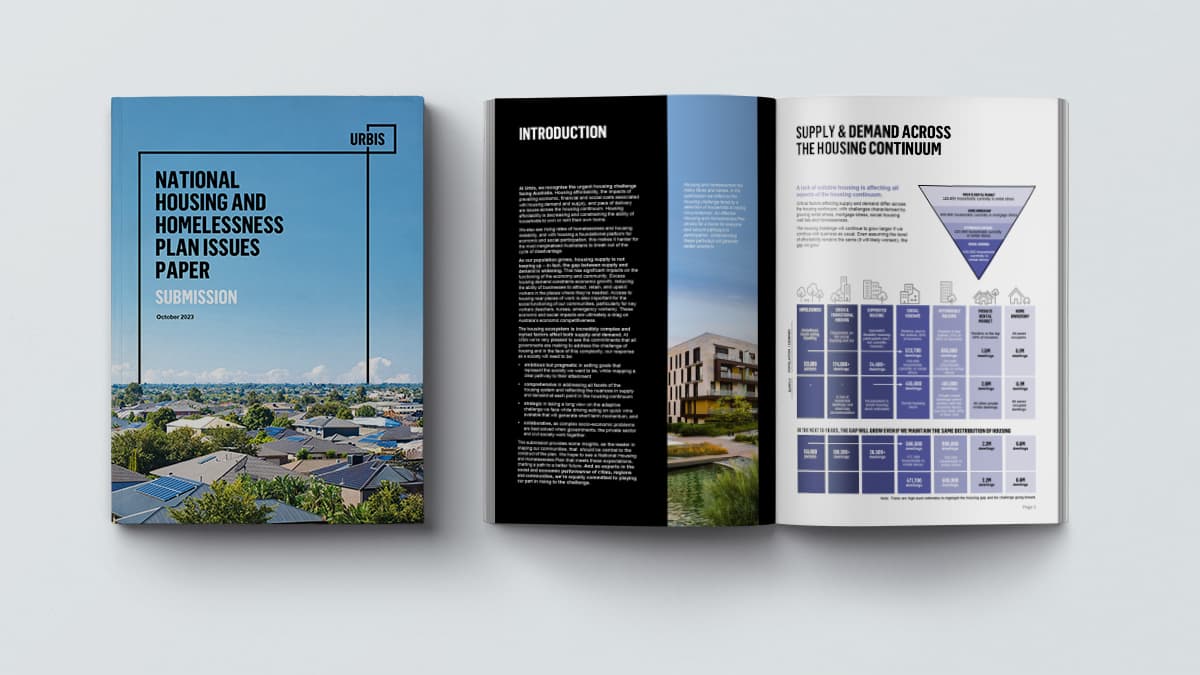A 'wicked problem': practical steps towards improving Australian housing supply

Housing affordability is decreasing and the rates of homelessness and housing instability are rising. The steady rise of our population is outgrowing the housing supply available, widening the gap between supply and demand and putting marginalised Australians at a greater disadvantage.
The Australian Government has released a prospective plan to address some of the key factors of the crisis – but does the plan go far enough to make significant change?
Acknowledging the incredibly complex nature of the housing ecosystem, we know that taking an ambitious but pragmatic approach to goal setting will generate better solutions for our country. From our position as the market leaders in shaping Australia’s cities and communities, we argue that an effective national Housing and Homelessness Plan truly strives to guarantee a home for everyone. A plan that meets these expectations will help set the course for a better future, for all.
We recently submitted our ‘National Housing and Homelessness Plan Issues Paper’ to government and anticipate a scheduled release of the formal Housing and Homelessness plan in 2024. Our submission champions practical recommendations and a holistic approach to the wicked problem that is Australia’s housing market. Here, we share our recommendations with you.
Supply & Demand
There are varying critical factors that affect supply and demand across the housing continuum, such as growing rental stress, mortgage stress, social housing wait lists, and homelessness. Even if we maintain the same distribution of housing that we currently have, the gap will continue to grow over the next 10 years, and affordability will likely worsen regardless.
While there is a range of housing options across the housing continuum, key sectors have been neglected over the years. For example, there has been a significant underinvestment and undersupply of social and affordable housing. The has resulted in growing waitlists and increased rates of homelessness amongst our population. With the pressures in this sector over-flowing into the private rental market, tenants are having a collective negative experience of the social housing system. It is a system that is both challenging and unsupportive towards the people who need it most.
The undersupply of dwellings within the private rental market is only emphasised by policy settings that perpetuate an imbalance of owners and tenants needs.
What does a healthy system look like?
It is crucial to the effectiveness of a national plan to ensure a balance between the demand and supply equation, to help put the housing continuum into a state of flow. There is no single solution to solving the challenges facing the housing continuum, rather we need to approach the issue from a broad range of policy levers to tackle the myriad of drivers feeding the issue. These policy levers propose to increase supply and reduce need for each area within the housing continuum.
With this in mind, we have some ideas on what will best shape a powerful national Housing and Homelessness Plan. The themes are:
- A home for everyone.
- Building communities, as well as homes.
- Equity for First Nations people.
- More diverse & higher density living.
- Future fit, resilient infrastructure.
- Unlocking affordable supply.
- Leveraging underutilised land.
- Sustaining joint efforts by government.
- Monitoring and measuring what matters.
A legacy opportunity
Our nation has never experienced the current environment we find ourselves in. These are unprecedented times and the call for a national approach is commendable. The plan needs to be aspirational while also being pragmatic and achievable. It should be a watershed moment in policy formulation and provide a clear pathway for all stakeholders to uphold and engage in achieving its outcomes.
Urbis are leaders in navigating communities through complex policy change processes. Our nine policy themes have been developed from input across our national network, drawing on perspectives from different disciplines and different urban environments. We thrive on engaging with communities to understand their needs and believe the plan needs to be developed with a human centric focus. Balancing this with a strong evidence base is where Urbis excels, and we believe we can play a critical role in supporting the next stages of the plan.
Download the National Housing and Homelessness Plan Issues Paper here.












